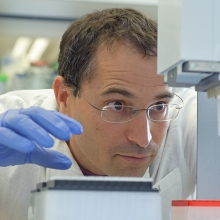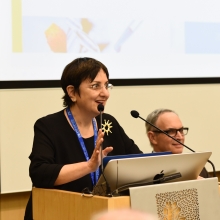Towards a drug against COVID-19
Co-led by Dr. Nir London, global consortium aims to accelerate drug development
Briefs

A cross-border initiative led by the Weizmann Institute’s Dr. Nir London has brought together a wide range of players in the drug development process—from academia in four countries, to biotech and contract research organizations, to specialized software companies—to accelerate the development of a drug for COVID-19.
Dr. London is collaborating with researchers at Oxford University, Memorial Sloan Kettering Cancer Center, University of British Columbia, a California biotech company PostEra, and Enamine, one of the largest chemical vendors in the world, to develop small molecules to target a key SARS-CoV2 protein that can halt and counteract the virus.
The partners have developed the means to characterize the structure of the main protease of SARS-CoV2—an essential enzyme that is responsible for a key step in the virus life cycle. Their goal: to target this enzyme’s activity effectively, which would be a key antiviral approach. By ramping up research production in a coordinated effort with contract research organizations (CROs) they are hoping the effort will lead to an effective anti-COVID-19 drug candidate in a matter of few months, dramatically faster than typical drug discovery.
Dr. London and his Weizmann team in the Department of Organic Chemistry are experts on the discovery of drugs that rely on the formation of covalent bonds. They developed an innovative electrophile-fragment screening platform, which they already used in the past against many various proteins. In the past two weeks, they have applied it to the viral protein (produced and shipped from the UK) and have identified promising initial hits that can potentially serve as starting points for COVID-19 drugs.
The Oxford University team and the Diamond Light Source (the UK's national synchrotron light source science facility), were able, in turn, to determine crystal structures showing how these compounds bind in the protease’s active site.
Altogether, the international group has already identified 78 initial hits against the SARS-CoV2 protease, 37 of which are covalent fragments originating from the London lab. What is needed now is the means to optimize those hits and generate a drug. Doing so requires not only the work of medicinal chemists, but also chemo-informatics and design experts to narrow down the field of possibilities.
Crowdsourcing for science
The researchers are hosting an online, crowdsourcing challenge to ask medicinal chemists and computer aided drug design experts around the world to design better molecules based on the available fragments. The drug discovery effort will thus be distributed and massively parallelized—that is, lots of scientists everywhere working to find the right candidate drugs.
Close to 2,000 designs have been submitted so far, and the challenge is ongoing. PostEra’s AI-based computational models are used to prioritize chemical synthesis and drug-binding simulations created by software project called Folding@Home would be used to predict binding affinity. Together, significantly accelerating the compound-design cycle.
Once such promising candidate drugs are identified, CROs and Enamine, will be on called to synthesize and test every compound’s safety.
Simultaneously, those compounds will be shipped to the researchers’ laboratories around the world—including the Weizmann Institute—to test for activity against COVID-19 protease. Promising compounds will then be tested against clinical isolates of the virus. Importantly, the researchers have agreed to share all their data openly to avoid bureaucracy and intellectual property considerations. All data is available in real time to the entire research community, inspiring a true open-science global collaboration.
They are hoping the effort will lead to an effective anti-COVID-19 drug candidate in a matter of months.
Dr. Nir London is supported by the Dr. Barry Sherman Institute for Medicinal Chemistry, Moross Integrated Cancer Center, the Helen and Martin Kimmel Center for Molecular Design, Rising Tide Foundation, the Joel and Mady Dukler Fund for Cancer Research, the Estate of Emile Mimran, Nelson Sirotsky, and Virgin JustGiving. He is the incumbent of the Alan and Laraine Fischer Career Development Chair. He runs the Honey and Dr. Barry Sherman Lab.








